May 24, 2025 | 20:44 GMT +7
May 24, 2025 | 20:44 GMT +7
Hotline: 0913.378.918
May 24, 2025 | 20:44 GMT +7
Hotline: 0913.378.918
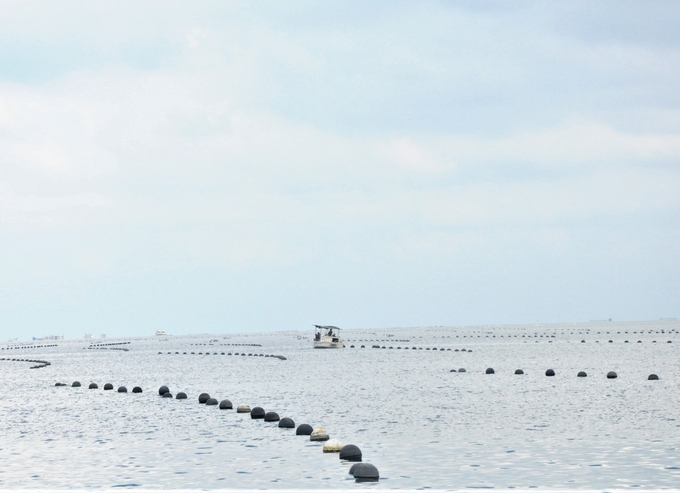
The project implementation area of Ngoc Hien Pearl Phu Quoc Company Limited has an area of more than 1,000 hectares of sea surface for high-tech pearl-cultured oyster farming with a closed and sustainable process. Photo: Trung Chanh.
As a coastal province in the Gulf of Thailand, Kien Giang has a total sea area of more than 63,000 km2, with hundreds of large and small islands, so it has great advantages for developing the ocean economy. Of which, Phu Quoc island city has a natural area of about 589 km2, with a coastline of 150 km and a sea area of approximately 6,000 km2, which is very convenient for the development of aquaculture.
Promoting this advantage, Ngoc Hien Pearl Phu Quoc Company Limited has pioneered in implementing the project "Culturing high-quality pearls," which brings economic, social, and environmental benefits and especially contributes to regenerating and protecting aquatic resources.
On an afternoon with nice weather, I and Mr. Nguyen Trong Hien, Deputy Director in charge of farming and project development of Ngoc Hien Pearl Phu Quoc Company Limited, went by canoe to the sea area in Rach Vem hamlet, Ganh Dau commune, Phu Quoc city, to visit the unit's oyster farming and pearl culturing area. Long rows of floating buoys bobbing on the water surface mark the farming area. Below are oyster cages suspended in the middle of the clear blue sea water.
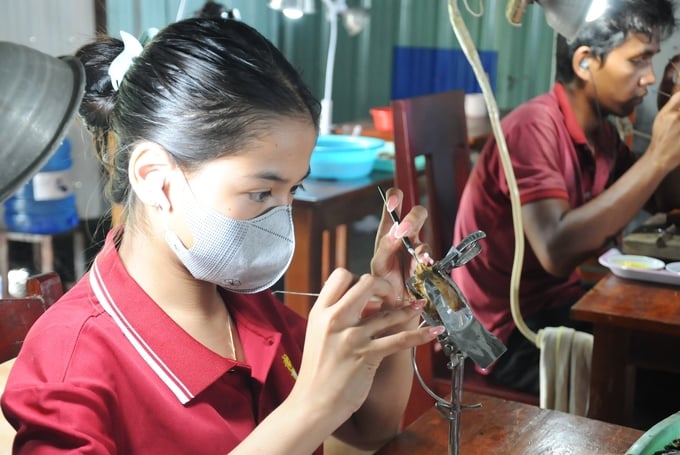
Technicians of Ngoc Hien Pearl Phu Quoc Company Limited are implanting embryos into oysters before releasing them into the sea to create pearls. Photo: Trung Chanh.
According to Mr. Hien, Ngoc Hien Pearl Phu Quoc Company Limited was a pioneer in investing in oyster farming and pearl culture in Phu Quoc waters nearly 30 years ago. Currently, the company is planning to rent a sea area with an area of over 1,000 hectares of water surface to implement a high-tech pearl-cultured oyster farming project with a closed and sustainable process. The project implementation plan is divided into two phases: Phase 1 of 2020-2024 will stock with an area of 504 hectares, and Phase 2 is 503 hectares, implemented from 2025 to 2030. The company commits to using the entire assigned sea area to invest in oyster farming and pearl culture, contributing to the implementation of Vietnam's ocean economic development strategy. The company is now creating jobs for over 230 workers, stabilizing life and social security, contributing to the local budget, and contributing to protecting sea and island sovereignty.
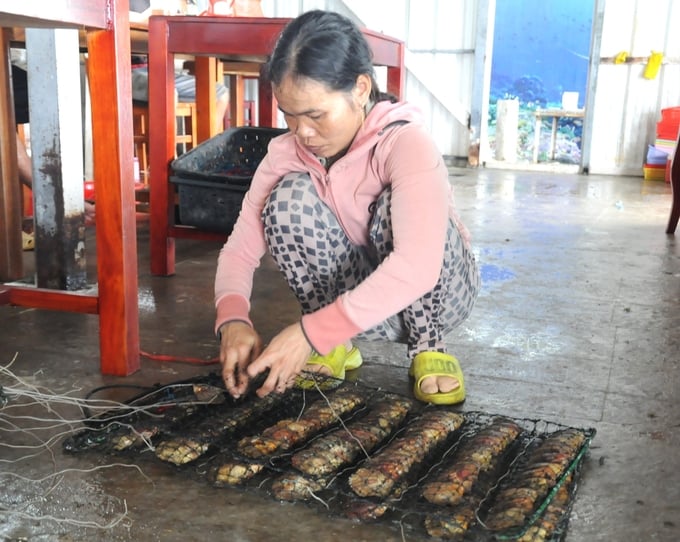
After being implanted with embryos, the oysters will be placed in cages and hung on buoy lines available in the sea for care, helping them continue to grow and create pearls. Photo: Trung Chanh.
Mr. Hien said that currently, Ngoc Hien Pearl Phu Quoc Company Limited has completely mastered the technology of producing oyster seeds, raising commercial oysters, and using raw oysters to implant embryos to create pearls. In phase 1 of the project (from 2020 to 2024), the company stocks on an area of 504 hectares, using two oyster species: Pinctada maxima and Pinctada martensii, and harvests them twice a year. The annual harvest output is about 450-500 kg of jude, equivalent to about 500,000 pearls of all kinds.
Phase 2 (from 2025 to 2030) will deploy an additional area of 503 hectares to reach a total area of more than 1,000 hectares of sea surface. With this area, the company will harvest about 900,000 to 1 million pearls/year. In addition to oyster farming and pearl culture, Ngoc Hien Pearl Phu Quoc Company Limited also builds and operates a supply chain for consuming products crafted from pearls to serve the domestic market and export to foreign countries such as Japan, the US, Europe, and some other Asian countries.
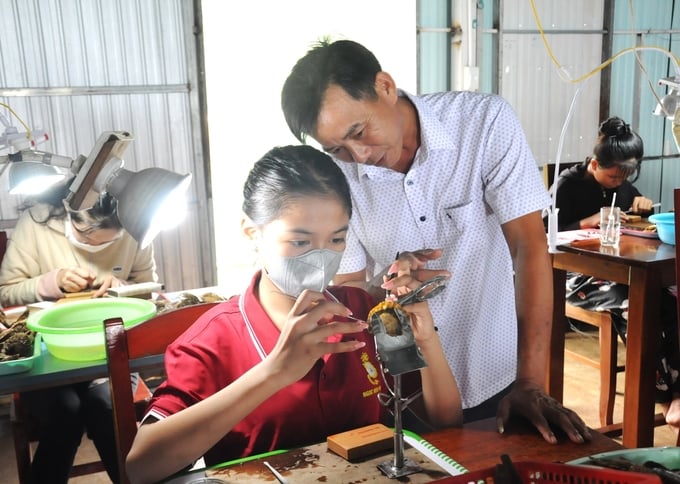
In addition to oyster farming and pearl culture, Ngoc Hien Pearl Phu Quoc Company Limited also operates a system of crafting pearl products to serve the domestic market and export to many countries around the world. Photo: Trung Chanh.
According to Mr. Hien, the State's implementation of the policy of allocating sea surface to businesses to develop aquaculture not only brings economic value but also contributes to the recovery and conservation of aquatic resources. Specifically, Ngoc Hien Pearl Phu Quoc Company Limited has implemented research into the production of artificial oyster seeds in order to be proactive in seed sources to develop sustainable aquaculture. This not only meets long-term production needs but also helps balance the ecology of Phu Quoc's marine environment.
Along with that, Ngoc Hien Pearl Phu Quoc Company Limited has coordinated with the Management Board of Phu Quoc Marine Protected Area to release 45 million oyster seeds into the natural area to regenerate resources. Besides, the company also cooperates with the Institute of Oceanography to create an artificial coral nursery to contribute to preserving biodiversity in Phu Quoc waters.
Translated by Thu Huyen
![Advanced mariculture – an inevitable trend: [1] Moving offshore](https://t.ex-cdn.com/nongnghiepmoitruong.vn/608w/files/phucpm/2025/05/18/0252-2436-nuoi-bien-6-162148_783.jpg)
(VAN) Mariculture using advanced technology and moving offshore is an inevitable trend, as nearshore areas increasingly reveal limitations.
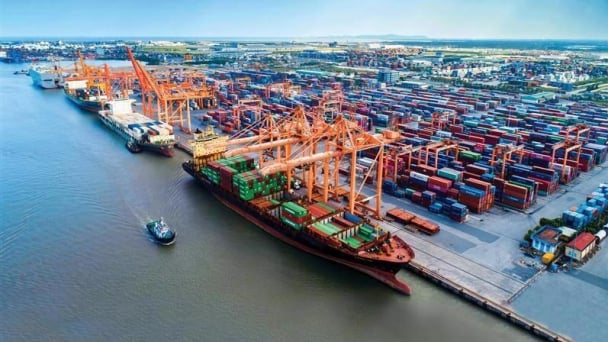
(VAN) South Korea is currently the second-largest investor in Hai Phong in terms of the number of projects (186 projects) and the largest in terms of total registered investment capital, reaching USD 14.2 billion.
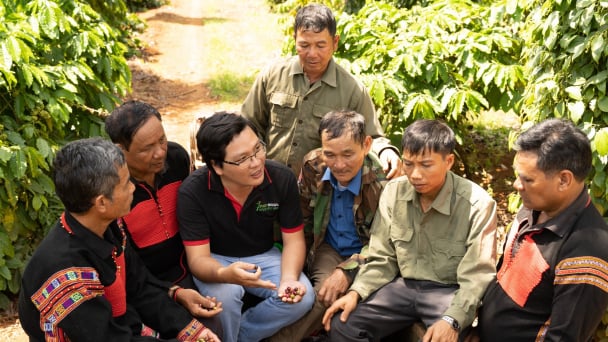
(VAN) As consumers become more environmentally conscious, legal regulations grow increasingly stringent...
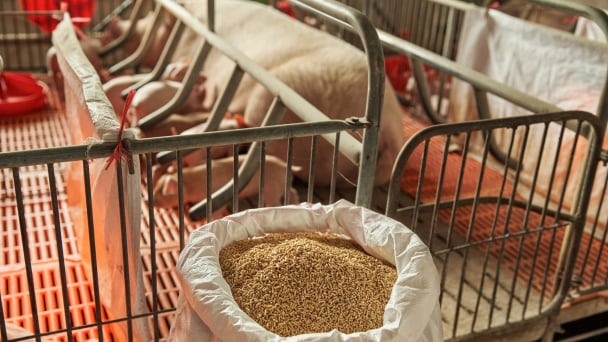
(VAN) CJ Feed&Care officially launched the FCR improvement campaign called “2025 Find Challenge Reach” in April 2025. In Vietnam, this campaign is implemented by CJ Vina Agri.
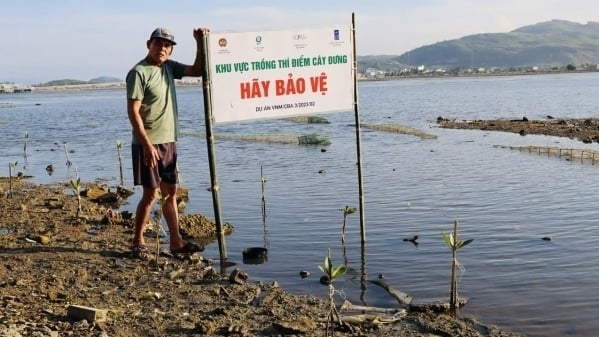
(VAN) The swamp in Pho Thanh is gradually being covered with red mangrove, creating a favorable environment for producing clean, high-quality salt.
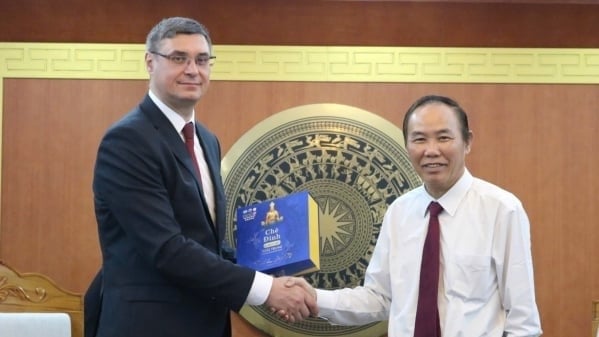
(VAN) The trade turnover of agro-forestry-fishery products is growing significantly, along with investment cooperation commitments that are opening up new development directions between Vietnam and Russia.

(VAN) Khanh Hoa is investing over 545 billion VND to develop 240 hectares of high-tech marine aquaculture in order to guarantee a consistent supply of seafood exports and achieve the USD 1 billion target.